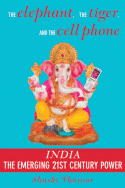Shashi Tharoor


I went to hear a conversation between Shashi Tharoor and Pramit Pal Chaudri, this Monday at the Asia Society. He was also releasing his newest book, The Elephant, the Tiger, and the Cell Phone: India, the emerging 21st Century Power.
The book consists of 68 essays on themes of Indian identity, explorations of work and play and the transformation within the social, political, economic and attitudinal realms.
He described ex Prime Minister Devi Gowda, giving a speech in Hindi, but since he does not speak Hindi, it was written out in his native script of Kanada. It is ironic, but acceptable for the Prime Minster to not know the national language. He compared the US where the presidents have all been white, male and Christian; while in India, an Italian Christian, Sikh and Muslim are all part of the political fray.
The second section was about Cricket. Which he felt was an Indian game that had been incidentally discovered by the British!
He felt the current politicians lacked a sense of humor, and he gave examples of Mahatma Gandhi, declaring after meeting the King of England that the King had enough clothes for both of them.
Also another often quoted line, about Western civilization, which could be a good idea.
The third cluster dealt with economic globalization.
He described the earlier slow moving Indian economy like an elephant that’s now moving with the speed of a tiger. India now has the most $ billionaires, a British steel company has been bought over by an Indian firm. 7m new cell phones are bought every year, which is a world record. Today people, who could never dream of owning a landline, are proud owners of cell phones. Drivers, plumbers, carpenters, tailors and massage therapists are some examples. India has the cheapest cell phone minutes in the world.
The dangers facing the country are the rise of sectarian voices, criminality in politics and poverty. There are also 10 m people entering the job force but only 1 m jobs. The Maoist insurrection was worrying and the endemic corruption. But he said he regarded the future with uncertainty, thus positively.
Mr. Chaudri asked Shashi what bothered and excited him about India.
He was excited by the idea of Indian’s being united by something larger than their caste, regional or religious affiliations. He felt jingoism was less, but this was replaced by a material complacency. Which disregarded those left behind. The lack of social security made people dependent on family structures and gave rise to a Maoist insurgency.
They then discussed the democratic structure that was adjusting to represent the population. Affluent voters do not matter any more, since the Poor’s votes overwhelm theirs. An example is chief minister Mayavati of UP who is a lower caste who has been voted into power. But voters are impatient, and 50% of parliamentarians lose their seats every 5 years.
Level of aspirations
They then went on to discuss the NGO’s like Parikrama in Karnataka, which was providing food, schooling and health care to poor children as well as their families.
There are 4 million NGO’s in India. Print media has 55% add revenues that advertise private education. Today’s poor people’s children feel they have more opportunities and can do better than their parents.
Indian Diaspora
Lots of diasporic Indians are returning to India temporarily, often working with NGO’s and some that are returning for good. He did mention those that live in Gated communities with names like Windsor Castle, were not really living in India.
Future heroes
The past heroes were saints and kings. Today’s heroes are infosys chairman Narayana Murthy, ex-President Abdul Kalam and film star Shahrukh Khan. 45% of young women want to be journalists.
The talk was informative and led by an articulate, educated and secular Shashi Tharoor. The audience asked relevant questions that were thoughtfully answered.

Comments